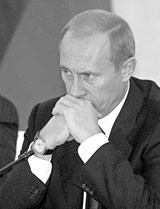A pig in a poke: Russian regional leaders to be elected no more
 According to some analysts, Russian President Vladimir Putin decided against public elections of Russian regional leaders after Mikhail Evdokimov, popular stand-up comedian had won the elections and became head of the Altaisky region.
According to some analysts, Russian President Vladimir Putin decided against public elections of Russian regional leaders after Mikhail Evdokimov, popular stand-up comedian had won the elections and became head of the Altaisky region.

Same analysts believe that the Beslan tragedy simply provided good opportunity for the president to make his decision public. It is also quite possible that Putin has simply been waiting for a chance to take vengeance for an earlier offence.
However, it appears that something else is at stake here. By proposing changes to the existing voting system, the president basically admits the fact that his idea of federal administrative districts as a strengthening basis of presidential authority turned out to be ineffective. It is noteworthy to mention that arguments made about four years ago concerning various ways the institute of plenipotentiaries should be regulated appear to be analogous to his present-day statements. Plenipotentiaries failed to live up to the initial expectations. The only thing they did manage to accomplish however is to fatten up.
However, during Putin's first presidential term, the president possessed full carte-blanche at hand. Today, you are fully entitled to address the following question to the president: Why weren’t these issues covered during his presidential campaign? Obviously, questions concerning state construction could not have escaped Mr. Putin"s attention long before the elections. From this perspective, innovation technology of presidential legislature appears roguish. The “Edinanaya Rossiya” (Unified Russia) political party will not even allow society to comprehend presidential proposal.
But questions remain nonetheless.
How will the prospective regional candidates be sorted out?
Will the procedure be contest-based?
Who will come up with a list of best candidates for president’s consideration in case there’ll be no open professional contest to fill the vacancy?
How could people contribute to the whole process of inauguration of regional leaders?
How can amendments help avoid second clause of article 11 of the Russian Constitution that states the following: “State authority throughout regions of the Russian Federation is being administered through specially designed departments of state authority”?
Do the newly designed drafts take into account the actual procedure, which will provide people with specific guidelines on how to call back certain appointees?
Will the plenipotentiary institute stay within the new system? If the answer is yes, then how heavy will the tax load be on civilians?
These are the basic questions that are in need of immediate answers. There are plenty more though. For instance, how will these appointments of regional leaders aid country’s unity and integrity? Since everyone still vividly remembers the ousting of prosecutor general Yuri Skuratov from the Federation Council, how does the president picture a possible way out from such “incidents” when authorities in various regions appear completely out of control?
For political analysts it is obvious that to come up with a qualified majority in the parliament is cheaper for sponsors than say, have prospective regional leaders running for the post. As far as “Unified Russia” is concerned, it is no secret that the party is no longer popular.
Undoubtedly, the problem of country's controllability, which has been screwed up badly by Putin's predecessor, needs to be solved once and for all. However, general approaches need to be discussed publicly. I personally consider that along with offers within the framework of that very discussion concerning ideological integrity of the multi-national country, former idea of Vladimir Zhirinovsky concerning territory division could be of use. More so, it seems far more promising.
Putin's motives are quite clear. During a TV show “The Duel”, Boris Nemtsov, who came to rebuttal the president has been completely crashed in the course of the discussion. This fact alone speaks volumes. Responsible Russian politicians are not thinking about foggy notions of freedom, imitations of which used to prosper during Yeltsin's times, but about the people of this country who have gone weary of the consequences of this imitation. People have gone weary of fear, implanted deep into their conscious after one single Yeltsin's phrase. It was addressed to the regions regarding sovereignty and terrorism.
With this in mind, Nemtsos appears in a rather strange position before Russians. However, American president George W. Bush appears to be even a greater fool. Failing to study Putin's initiatives in greater detail, Bush Jr. has publicly expressed his discontent. More so, he has even criticized them. One might get an impression as though by the end of his first presidential term this Republican did manage to learn the names of some countries; he did however fail to perceive the difference between them. In any case, the man who managed to become president of the United States as a result of a major scandal looks rather foolish in his attempt to teach others what to do, especially while electoral legislation in his own country is a mess. But these are the problems American public should be concerned with.
As for us, we need to worry about answers on those above-mentioned questions regarding Putin’s initiatives. How long should we wait?
Subscribe to Pravda.Ru Telegram channel, Facebook, RSS!


